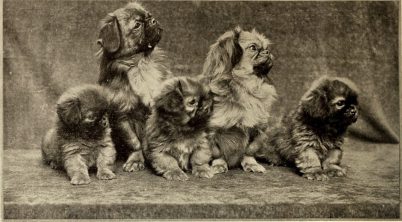The Pekingese, a breed with a regal history dating back over a thousand years, is cherished for its distinctive appearance and affectionate personality. However, this toy dog breed is predisposed to several health issues that potential and current owners should be aware of. Their unique physical structure and genetic makeup contribute to these concerns, making vigilant healthcare and regular veterinary check-ups a necessity for maintaining the breed’s well-being.
Common health issues afflicting the Pekingese range from heart disease, particularly mitral valve disease, to various eye conditions, and respiratory difficulties due to their shortened snout. While some of these conditions are inherited, others can be influenced by factors such as diet, exercise, and overall care.
Additionally, Pekingese can suffer from diseases affecting their skin and joints, dental problems, and may exhibit symptoms like abnormal behavior or changes in mental health. Understanding these health risks and providing appropriate care and treatment can lead to a more comfortable and fulfilling life for these companionable canines.
Table of Contents
General Health and Breed Characteristics
The Pekingese, a toy breed with a regal history of living alongside ancient Chinese royalty, has distinctive physical and health-related traits. They are known for their bold and affectionate temperament, thriving in socialization and human companionship.
Breed Health Problems
Several health issues are notable within the breed:
- Brachycephalic Syndrome: Their short snouts can lead to breathing problems.
- Obesity: Weight gain is common; they require monitoring of their diet and exercise.
- Eye Conditions: Large eyes can be prone to various disorders.
- Mitral Valve Disease: A prevalent heart condition in the breed.
| Health Issue | Description |
|---|---|
| Breathing difficulties | Brachycephalic airways can cause labored breathing, especially in heat or stress. |
| Weight Management | Overfeeding and lack of exercise can lead to obesity which often worsens breathing problems. |
| Sensitive Skin | They have a double coat that needs regular brushing to prevent skin issues. |
| Blood Disorders | Conditions like autoimmune hemolytic anemia can occur. |
Temperament and Care Pekingese dogs are confident and affectionate but can be sensitive, necessitating gentle handling. Regular grooming, including brushing of their dense double coat, is essential to prevent shedding issues and maintain their lion-like mane in good condition. It is imperative for owners to commit to the grooming needs of the Pekingese to avoid matting and skin problems. Socialization from a young age fosters their personality development, enabling them to adapt to various environments and interactions.
Common Health Conditions and Diseases
The Pekingese breed, characterized by its distinct appearance and personality, is unfortunately prone to certain health issues. These conditions can affect their quality of life and require attention from pet owners. Below are key health concerns categorized by bodily systems.
Eye Conditions
Pekingese dogs commonly face eye conditions due to their prominent eyes. Progressive retinal atrophy, cataracts, and glaucoma are serious ailments that may lead to impaired vision or blindness. Moreover, dry eye, characterized by insufficient tear production, and cherry eye, a prolapse of the third eyelid, can cause discomfort and require medical treatment.
Respiratory and Cardiovascular Issues
Brachycephalic breeds like the Pekingese often suffer from respiratory system issues. Breathing problems and snoring are typically observed due to their flat faces and narrow nostrils. Furthermore, heart disease in Pekingese can stem from congenital issues or develop with age, affecting their heart’s ability to pump blood effectively.
Musculoskeletal Disorders
Pekingese dogs are predisposed to various musculoskeletal disorders. Arthritis and hip dysplasia can lead to pain and lameness. Another concern is luxating patella, where the kneecap dislocates, causing lameness or abnormal gait, which may necessitate surgical intervention.
Skin and Coat Problems
Skin problems in Pekingese include allergies that cause irritation and discomfort. Regular grooming is essential to manage shedding and prevent skin infections. Pet owners need to be vigilant of signs like itching, redness, or unusual skin conditions to seek early treatment.
Dental and Oral Health Issues
Pekingese are also prone to dental issues. The buildup of plaque can lead to dental disease, resulting in bad breath, tooth loss, or other oral health problems. Regular dental check-ups and proper oral hygiene practices help prevent such conditions.
Prevention and Care
To maintain the health and happiness of a Pekingese, owners need to pay attention to several key areas of care. Proactive measures in nutrition, veterinary visits, grooming, and activity can prevent numerous common health problems.
Nutrition and Weight Management
A Pekingese’s diet should be high-quality and portion-controlled to prevent obesity, a common issue that exacerbates heart conditions and breathing difficulties. Owners should consult a veterinarian to determine the appropriate diet and serving sizes for their pet.
Regular Veterinary Care
Routine visits to the veterinarian for vaccinations, early detection of diseases, and timely intervention with medication are crucial. Early detection of ailments allows for a better prognosis and management of any ongoing health conditions.
Grooming and Hygiene
Regular brushing prevents matting while keeping the Pekingese’s folds clean reduces the risk of skin infections. Owners should also pay attention to dental hygiene to avoid dental issues and ensure prompt care for any signs of ear infections.
Exercise and Activity
Sufficient exercise keeps a Pekingese’s weight in check and maintains cardiovascular health. However, due to their brachycephalic nature, one should ensure playful activities aren’t too strenuous to avoid over-exertion and breathing issues.
Breeding and Genetic Conditions
Responsible breeders recognize the importance of health testing in Pekingese, a breed known for its distinctive appearance and variety of coat colors, including red, tan, sable, black, white, cream, and gray. They prioritize the identification of heritable conditions to ensure the health of their litters.
Genetic Disorders:
- Progressive Retinal Atrophy (PRA): This genetic condition leads to the deterioration of the retina and can result in blindness. Pekingese breeders can test for PRA to prevent breeding affected dogs.
- Heart Disease: Genetic predisposition, coupled with environmental factors like diet and exercise levels, contribute to heart conditions in Pekingese.
Breeder’s Role:
- Health Testing: To reduce the risk of genetic diseases, breeders should conduct thorough health screenings.
- Diet and Exercise: Breeding programs should also focus on lifestyle factors that affect the breed’s health.
Ethical Considerations:
- In China, the Pekingese breed’s country of origin, there is an increased awareness of the breed’s specific health challenges.
- Ethically-minded breeders seek to maintain the health and genetic diversity of the Pekingese without compromising their well-being.
Coat Colors and Genetic Health:
- While a Pekingese’s coat color, ranging from red to gray, does not directly correlate with health conditions, breeders must be mindful of genetic health beyond physical traits.
Breed clubs and associations can provide resources and education to breeders, aiding them in making informed decisions about breeding practices that prioritize the health of the Pekingese breed.
* Banner photo by Oliver Townshend, cropped | Some rights reserved








